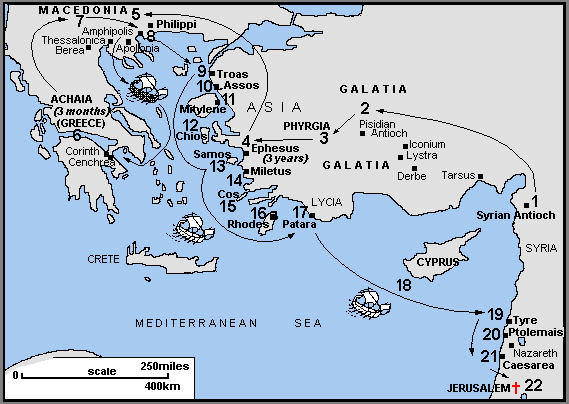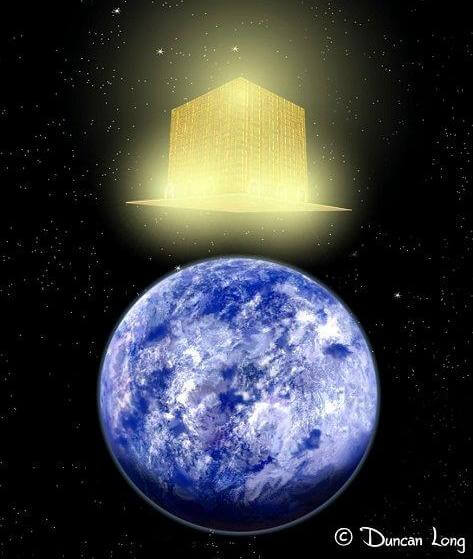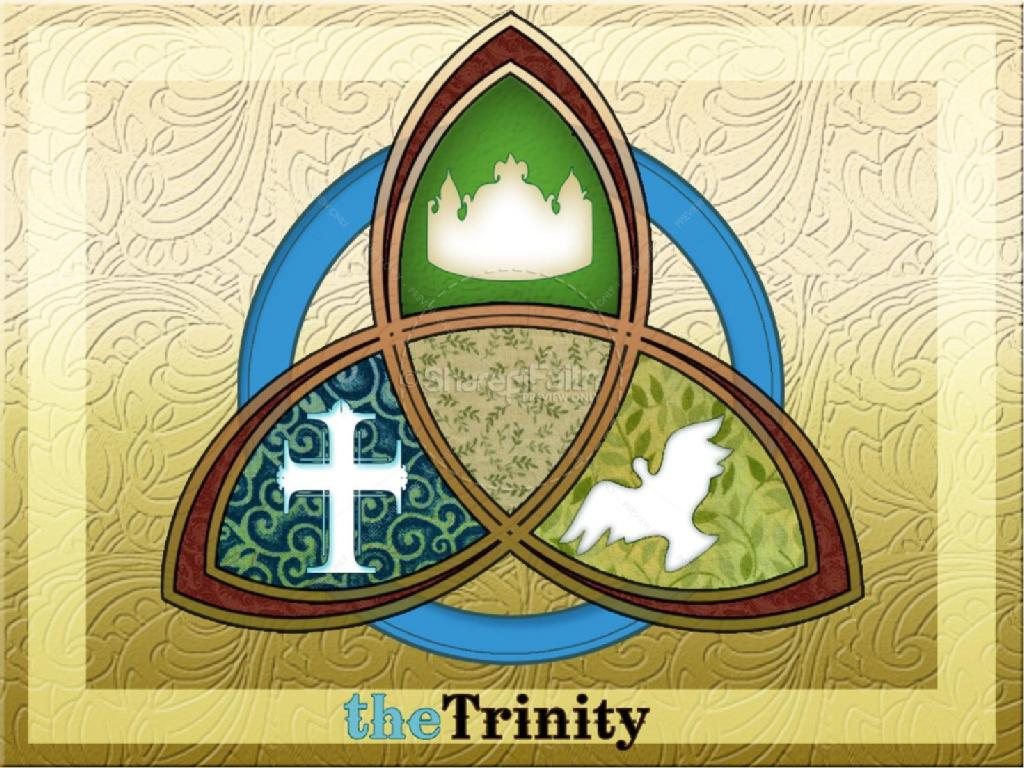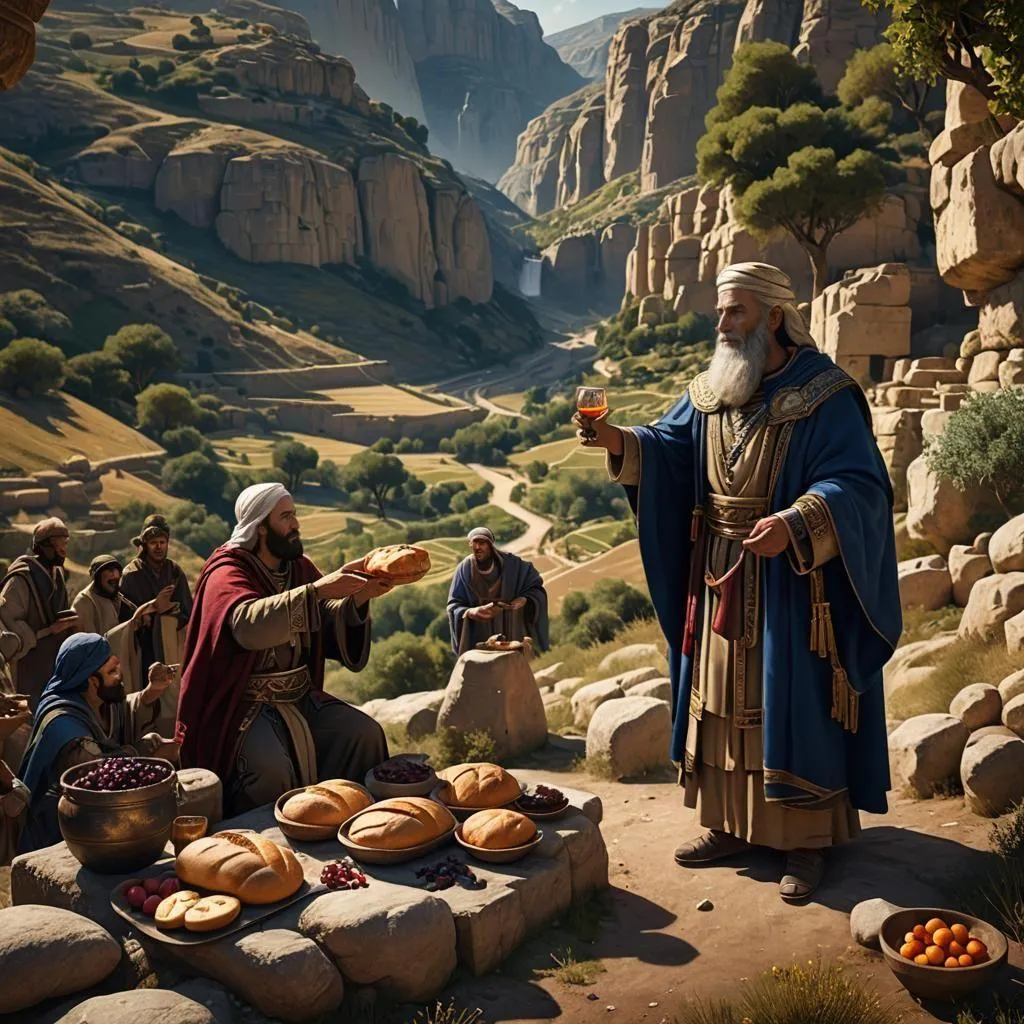The Coming of Jesus: The Olivet Discourse – Part 1

Series Index
- The Coming of Jesus: Introduction
- The Coming of Jesus: Daniel's 70 Weeks
- The Coming of Jesus: Coming on the clouds
- The Coming of Jesus: The Olivet Discourse – Part 1
- The Coming of Jesus: The Olivet Discourse – Part 2
- The Coming of Jesus: Revelation Fulfilled?
- The Coming of Jesus: Our Future Hope - What Now?
Hello again, it's been a while since I've wrote anything, and longer since getting back to this series on the Second Coming of Jesus. This isn't for lack of motivation, but rather because this is such a huge topic that I've been reading and thinking about this next part for a very long time to make sure I know what I'm saying, and am well read enough to do the topic justice. Having said that, there will always be far more to say on this than I can give time for here, but I hope to give enough of an overview to expound this prophecy faithfully without being too technical as to cause confusion! You can also catch up on the previous parts in the series here and here.
Birth Pangs
I'm going to do this part of the series in two sections, otherwise it would get too long and wordy! This part will focus on the "birth pangs" Jesus warned about which would lead up to the coming judgement and destruction of the temple.
The Olivet discourse is the prophecy given by Jesus in the Gospels of Mark 13, Matthew 24, Luke 21. Most Christians are probably more familiar with the Matthew 24-25 version than the others, though they are all the same prophetic message of impending judgement.
If you're at all familiar with any doctrine or teaching on the "Second Coming" or "End Times", then these passages in the Gospels are most often quoted and used to say that Jesus is talking about a terrible time that is coming in the far, far, far off future, usually interpreted to mean within our lifetime (for some reason).
I, too, used to believe this as it was what I was taught in the churches I attended and told by the people I met, all with that eager expectation that Jesus could suddenly swoop down from the clouds any day now! What I didn't ever do was investigate these claims properly for myself, except read the parts of Scripture they said meant Jesus was coming in the future and then try to accept that it must be right since our church leaders were obviously more knowledgeable on this than I. Although I did spend a lot of time studying and trying to interpret Revelation as a new Christian (without much success I might add), I couldn't shake the feeling I got that the Apostles and Jesus all seemed to speak and write as though they expected something to happen then and very soon. Back in the early 2000's, searching the internet for theological help generally brought up lots of odd and wacky websites, complete with animated fire GIFs, or forums full of equally as confused believers trying to wrangle the "soon-ness" of the Scriptures with a far-future interpretation. So I did what any good Christian did, and just chalked it up to "God's ways are not our way" or "God's soon/time isn't the same as how we understand it".
This is where I wish that the Church would know its history better and have a desire to exegete things well, rather than fob off the confusing/hard passages with catchphrases. Think of it this way: if God was going to give a prophecy and be accurate and precise in all the details, why would he then be obscure about the timing of it?
With that said, lets look at the prophecy Jesus gives.
Apocalypse then (not later)
Something that seems to go unnoticed, or is overlooked, in discussions about this prophecy, are the "timestamps" that Jesus uses to say when this will be fulfilled. Even in the preceding chapter in Matthew and its parallel in Luke, after Jesus has said all his woes about the Pharisees, he says something quite interesting which I admit, I hadn't really noticed until the other day:
Luke 11:49-51
Therefore also the Wisdom of God said, ‘I will send them prophets and apostles, some of whom they will kill and persecute,’ so that this generation may be charged with the blood of all the prophets shed since the foundation of the world, from the blood of Abel to the blood of Zechariah, who perished between the altar and the sanctuary. Yes, I tell you, it will be charged against this generation. (cf. Matthew 23:34-36)
Jesus bluntly tells them that basically the Pharisees are hypocrites, and are partakers in the slaughter of God's holy prophets, even if they weren't alive at the time since they built tombs for them and proclaimed that they wouldn't have aided in the killing of the prophets – all the while plotting to kill Jesus who was regarded as a prophet by the people. Now because of this, Jesus says that his generation would have the charge of all the prophets murders from the beginning put on them, and ultimately, the guilt of killing God's Messiah too. This is important to realise and remember, as that's quite a hefty charge, and the sentence and punishment is what follows in the Olivet Discourse which was to come upon that generation not ours.
Matthew 24, Mark 13 and Luke 21 all begin with the disciples pointing out how grand the temple was and Jesus saying to them that it "all will be thrown down". The temple was (and is) a big deal the Jewish people, so understandably, the disciples were concerned and wanted to know more about when it would be destroyed.
Matthew 24:3
When he was sitting on the Mount of Olives, the disciples came to him privately, saying, “Tell us, when will this be, and what will be the sign of your coming and of the end of the age?” (cf. Luke 21:7; Mark 13:3-4)
It's important to note here that the disciples rightly ask about the end of the age – not the world. I believe a lot of the confusion on this (and other doctrines) has come from teaching based on the King James Bible rather than the underlying Greek and/or better English translations. For example, this verse is translated as "end of the world" in the KJV, whereas all other Bibles you read will (hopefully) say "end of the age". The Greek word translated "world" in the KJV is actually the word aion, meaning "age" or "eon", which has completely different connotations than the destruction of the physical universe.
So the disciples have just been told that the temple will be destroyed, so their obvious question is when and how will be know it's about to happen?
Jesus answers them plainly by laying out everything that will happen in the run up to this massive event, and as we'll see, all these signs did happen as foretold and are document in the historical record.
Mark and Matthew are generally accepted to be the earliest Gospels written, probably somewhere between 50-55AD (Luke's Gospel about a decade later), both of which record Jesus' prophecy here (which would have been spoken even earlier) long before the actual events took place. Most, if not all, of the New Testament was written before 70 AD which is when the temple was destroyed, so we'll never read about the fulfillment of this prophecy in the Scriptures. For that, we need to turn to Josephus – a first century historian who was an eyewitness to the destruction, and was involved in the events leading up to (and after) it.
The historical record and prophetic fulfillment of the "birth pangs"
Here I'm going to highlight the signs Jesus gave to warn his followers about what was to come, which he called the "birth pangs" (Matt 24:8), and how they have already happened within the timeframe he gave (that generation).
Matthew 24:4-5
Jesus answered them, “Beware that no one leads you astray. For many will come in my name, saying, ‘I am the Messiah!’ and they will lead many astray. (cf. Mark 13:5-6; Luke 21:8)
Josephus records the coming of men who claimed messianic roles and divine authority to save Israel from impending doom in miraculous ways. These men failed, the miracles and prophecies didn't happen, and they and their followers were killed by the Roman soldiers.
Flavius Josephus, "Wars of the Jews" Book 2 chapter 13
Another body of wicked men also sprung up, cleaner in their hands, but more wicked in their intentions, who destroyed the peace of the city no less than did these murderers [the Sicarii]. For they were deceivers and deluders of the people, and, under pretense of divine illumination, were for innovations and changes, and prevailed on the multitude to act like madmen, and went before them in the wilderness, pretending that God would there show them signs of liberty
Next up was the warning of wars. In a time where you may think war and conflict was common, this sign holds more meaning as this was prophesied during the famous "Pax Romana" – Latin for "Roman Peace". It was a time when the Roman Empire had relative peace and harmony with everyone, and thus wars and conflict were little to none. But what we see from history, is that as time drew closer to 70 AD, seditions and rebels were rising up against Rome from within Jerusalem and Israel as a whole.
Matthew 24:6
And you will hear of wars and rumors of wars; see that you are not alarmed; for this must take place, but the end is not yet. (cf. Mark 13:7; Luke 21:9)
The next sign is that of famine and earthquakes. We actually can read about the famine which struck the land in the book of Acts too, which was prophesied about again to warn the churches to prepare.
Matthew 24:7
For nation will rise against nation, and kingdom against kingdom, and there will be famines and earthquakes in various places (cf. Mark 13:8; Luke 21:11)
The famine began during the time of Acts 11, which was in 46 AD. Various other historians mention this famine in their historical accounts too.
Acts 11:27-28
At that time prophets came down from Jerusalem to Antioch. One of them named Agabus stood up and predicted by the Spirit that there would be a severe famine over all the world; and this took place during the reign of Claudius.
Josephus also records how Helena, Queen of Adiabene, aided the people struck by the famine:
Flavius Josephus, "Antiquities" Book 20 chapter 2.5: 51-53
Now her coming was of very great advantage to the people of Jerusalem; for whereas a famine did oppress them at that time ... queen Helena sent some of her servants to Alexandria with money to buy a great quantity of corn...
There were also other famines later, as the Roman troops eventually surrounded Jerusalem:
Flavius Josephus, "Wars of the Jews" Book 6 chapter 3
Now of those who perished by famine in the city, the number was prodigious, and the miseries they underwent were unspeakable
And earthquakes:
Flavius Josephus, "The Jewish War" Book 4 chapter 4.5
...for there broke out a prodigious storm in the night, with the utmost violence, and very strong winds, with the largest showers of rain, with continued lightnings, terrible thunderings, and amazing concussions and bellowings of the earth, that was in an earthquake.
In Luke's Gospel, this sign has some addition information that there would also be "dreadful portents and great signs from heaven" too. This, too, is also documented by Josephus, himself almost in disbelief about what seen, except that it was recounted by so many witnesses.
Flavius Josephus, "The Jewish War" Book 6 chapter 5.3
Thus there was a star resembling a sword, which stood over the city, and a comet, that continued a whole year. Thus also before the Jews’ rebellion, and before those commotions which preceded the war, when the people were come in great crowds to the feast of unleavened bread, on the eighth day of the month Xanthicus, and at the ninth hour of the night, so great a light shone round the altar and the holy house, that it appeared to be bright day time; which lasted for half an hour. This light seemed to be a good sign to the unskilful, but was so interpreted by the sacred scribes, as to portend those events that followed immediately upon it. At the same festival also, a heifer, as she was led by the high priest to be sacrificed, brought forth a lamb in the midst of the temple. Moreover, the eastern gate of the inner [court of the] temple, which was of brass, and vastly heavy, and had been with difficulty shut by twenty men, and rested upon a basis armed with iron, and had bolts fastened very deep into the firm floor, which was there made of one entire stone, was seen to be opened of its own accord about the sixth hour of the night… Besides these, a few days after that feast, on the one and twentieth day of the month Artemisius a certain prodigious and incredible phenomenon appeared: I suppose the account of it would seem to be a fable, were it not related by those that saw it, and were not the events that followed it of so considerable a nature as to deserve such signals; for, before sun-setting, chariots and troops of soldiers in their armor were seen running about among the clouds, and surrounding of cities. Moreover, at that feast which we call Pentecost, as the priests were going by night into the inner [court of the temple] as their custom was, to perform their sacred ministrations, they said that, in the first place, they felt a quaking, and heard a great noise, and after that they heard a sound as of a great multitude, saying, 'Let us remove hence'.
The following signs are also ones we can see fulfilled in the book of Acts too, which is that of martyrdom for standing for Jesus and proclaiming his Gospel message, and those who will depart the faith.
Matthew 24:9-10, 12
Then they will hand you over to be tortured and will put you to death, and you will be hated by all nations because of my name. Then many will fall away, and they will betray one another and hate one another ... And because of the increase of lawlessness, the love of many will grow cold. (cf. Mark 13:9-13; Luke 21:12-17)
The stoning of Stephen is the first martyr we come across, and it doesn't stop there. Before Paul (then, Saul) met with the risen Jesus, he was going from town to town arresting and killing the followers of Jesus.
Acts 7:54-60
When they heard these things, they became enraged and ground their teeth at Stephen ... Then they dragged him out of the city and began to stone him; and the witnesses laid their coats at the feet of a young man named Saul.
Acts 22:4
I persecuted this Way up to the point of death by binding both men and women and putting them in prison,
In Paul's letter to Timothy, he speaks of those who were working with him in the faith now falling away back to their old lives, and in the Revelation of John, Jesus encourages the churches to hold onto their first love and to not let it go cold (Rev 2:4; Rev 3:16).
2 Tim 4:9-11
Do your best to come to me soon, for Demas, in love with this present world, has deserted me and gone to Thessalonica; Crescens has gone to Galatia, Titus to Dalmatia. Only Luke is with me. Get Mark and bring him with you, for he is useful in my ministry.
Coming to the end of the "birth pangs" are the warnings of false prophets arising and leading people astray, which again, we can read about happening within Jerusalem at the time. This sadly led many people to their deaths by following them.
Matthew 24:11
And many false prophets will arise and lead many astray.
After Jesus died, there were many false prophets popping up trying to lead the people and give them messages and signs from God (all of which failed). When Paul is questioned by the Roman authorities in Acts, they confuse him for one of the earlier false prophets known as "the Egyptian" who led many into the wilderness (Acts 21:37-38). This is another instance which Josephus records in his Antiquities of the Jews (quoted below) and also in The War of the Jews, book 6, chapter 5.2.
Flavius Josephus, "Antiquities" Book 20 Chapter 8.5
These deeds of the robbers filled the city with all sorts of impiety. And now conjurers and deceivers persuaded the multitude to follow them into the wilderness, and pretended that they would show them manifest wonders and signs that would be performed by the providence of God. And many that were persuaded suffered the pain of their folly, for Felix brought them back and punished them. At this time there came out of Egypt to Jerusalem a man who said he was a prophet, and advised the multitude of the common people to go along with him to the mountain called the Mount of Olives, which lay a distance of five furlongs from the city. He said that he would show them that at his command the walls of Jerusalem would fall down, through which he promised that he would procure them an entrance into the city. Now when Felix was informed of this he ordered his soldiers to take up their weapons, and with a great number of horsemen and footmen from Jerusalem he attacked the Egyptian and the people that were with him. He slew four hundred of them and took two hundred alive. But the Egyptian himself escaped from the fight and did not appear any more. And again the robbers stirred up the people to make war with the Romans.
The final part to note about these signs is that there is a time on them as to when and how long they'd last. The end wouldn't come until the Gospel had been spread throughout the world.
Matthew 24:14
And this good news of the kingdom will be proclaimed throughout the world, as a testimony to all the nations; and then the end will come. (cf. Mark 13:10)
Though this may sound like something that hasn't happened yet, the term "world" here can also refer colloquially to the known world or even just the local region. The Greek word translated as "world" in this verse is Oikoumene which can be defined or translated as "the inhabited earth" or even more specifically as "the Roman empire, all the subjects of the empire"! This is also backed up by what Jesus tells his disciples earlier on in Matthew, in which this verse in chapter 24 is a repeat of:
Matthew 10:21-23
Brother will betray brother to death, and a father his child, and children will rise against parents and have them put to death; and you will be hated by all because of my name. But the one who endures to the end will be saved. When they persecute you in one town, flee to the next; for truly I tell you, you will not have gone through all the towns of Israel before the Son of Man comes.
That narrows it down significantly. Jesus quite clearly tells his disciples that they won't have travelled through all of the towns in Israel before "the Son of Man" comes — and unless we want to say that Jesus was wrong, then this has to be the case and the coming of the Son of Man must have another meaning, other than the total destruction of the universe. If this conflicts with what you currently believe about Jesus/the Son of Man's coming, then surely you must have to adjust your doctrine to match Scripture, not the other way around.
By looking at maps created to show the routes of Paul's missionary journeys, we can see that the Gospel was spread throughout the known world, and thus brought about the end of the birth pangs, giving birth to the wrath of God which was to come upon the nation of Israel.

Even in writing his letters to the churches, Paul appears to believe that he has spread the Good News to all the world, which would seem to show that in Paul's mind, "the world" wasn't the whole globe as we might think of it today.
Col 1:23
...provided that you continue securely established and steadfast in the faith, without shifting from the hope promised by the gospel that you heard, which has been proclaimed to every creature under heaven. I, Paul, became a servant of this gospel.
And also in the letter to the Romans, Paul declares that the faith of these believers is even proclaimed throughout the world – how much more so then was the Gospel?
Rom 1:8
First, I thank my God through Jesus Christ for all of you, because your faith is proclaimed throughout the world.
So to conclude, Jesus gave his followers specific signs to watch out for which would forewarn and usher in his coming. These signs are documented in the historical and Biblical record to show that what Jesus prophesied came to pass. All throughout the New Testament there is an urgency and expectancy that he would be coming "soon" and that the time was near (eg. James 5:7-8; Rev 1:1); and this is why: because it was! The apostles knew the signs and could see them happening around them, and so warned the churches to hold fast to their fath!
In part 2 of this topic, I will be looking at the what happened when the destruction came upon Jerusalem and how that was fully ushering in of Kingdom of God and the New Covenant, and how it ties in with Daniel's prophecies and also with Revelation.
Further Reading:
- http://www.jewishencyclopedia.com/articles/12416-pseudo-messiahs#anchor2
- http://en.wikipedia.org/wiki/Pax_Romana
- http://en.wikipedia.org/wiki/Josephus
- http://www.biblehistory.net/newsletter/acts11_famine.htm
- http://www.amazon.co.uk/Josephus-Complete-Edition-published-Thomas/dp/B00E27XLCG/
- http://www.josephus.org/ntparallels2.htm#Famine
- http://www.earlyjewishwritings.com/text/josephus/war4.html
- http://www.strangehistory.net/2011/02/28/josephus-armies-in-the-sky/
- http://www.agudatbris.com/writtings2010/JudgingtheKingdom.pdf
- http://www.josephus.org/ntparallels2.htm#Egyptian
- http://www.ccel.org/ccel/josephus/complete.iii.vii.v.html
- http://www.biblestudytools.com/lexicons/greek/nas/oikoumene.html
- http://en.wikipedia.org/wiki/Ecumene
- http://www.ccel.org/bible/phillips/CN092MAPS1.htm
Leave a comment Like Back to Top Seen 3.8K times Liked 3 times
Enjoying this content?
Support my work by becoming a patron on Patreon!
By joining, you help fund the time, research, and effort that goes into creating this content — and you’ll also get access to exclusive perks and updates.
Even a small amount per month makes a real difference. Thank you for your support!
Subscribe to Updates
If you enjoyed this, why not subscribe to free email updates and join over 864 subscribers today!
My new book is out now! Order today wherever you get books
Recent Posts
Luke J. Wilson | 19th August 2025 | Fact-Checking
A poetic post has been circulating widely on Facebook, suggesting that our anatomy mirrors various aspects of Scripture. On the surface it sounds inspiring, but when we take time to weigh its claims, two main problems emerge. The viral post circulating on Facebook [Source] First, some of its imagery unintentionally undermines the pre-existence of Christ, as if Jesus only “held the earth together” for the 33 years of His earthly life. Second, it risks reducing the resurrection to something like biological regeneration, as if Jesus simply restarted after three days, instead of being raised in the miraculous power of God. Alongside these theological dangers, many of the scientific claims are overstated or symbolic rather than factual. Let’s go through them one by one. 1. “Jesus died at 33. The human spine has 33 vertebrae. The same structure that holds us up is the same number of years He held this Earth.” The human spine does generally have 33 vertebrae, but that number includes fused bones (the sacrum and coccyx), and not everyone has the same count. Some people have 32 or 34. More importantly, the Bible never says Jesus was exactly 33 when He died — Luke tells us He began His ministry at “about thirty” (Luke 3:23), and we know His public ministry lasted a few years, but His precise age at death is a tradition, not a biblical statement. See my other recent article examining the age of Jesus here. Theologically, the phrase “the same number of years He held this Earth” is problematic. Jesus did not hold the world together only for 33 years. The eternal Word was with God in the beginning (John 1:1–3), and “in Him all things hold together” (Colossians 1:17). Hebrews says He “sustains all things by His powerful word” (Hebrews 1:3). He has always upheld creation, before His incarnation, during His earthly ministry, and after His resurrection. To imply otherwise is to risk undermining the pre-existence of Christ. 2. “We have 12 ribs on each side. 12 disciples. 12 tribes of Israel. God built His design into our bones.” Most people do have 12 pairs of ribs, though some are born with an extra rib, or fewer. The number 12 is certainly biblical: the 12 tribes of Israel (Genesis 49), the 12 apostles (Matthew 10:1–4), and the 12 gates and foundations of the New Jerusalem (Revelation 21). But there’s no biblical connection between rib count and these symbolic twelves. This is a case of poetic association, not design woven into our bones. The only real mention of ribs in Scripture is when Eve is created from one of Adam’s ribs in Genesis 2:21–22, which has often led to the teaching in some churches that men have one less rib than women (contradicting this new claim)! 3. “The vagus nerve runs from your brain to your heart and gut. It calms storms inside the body. It looks just like a cross.” The vagus nerve is real and remarkable. It regulates heart rate, digestion, and helps calm stress, and doctors are even using vagus nerve stimulation as therapy for epilepsy, depression, and inflammation showing it really does “calm storms” in the body. But it does not look like a cross anatomically. The language about “calming storms” may echo the way Jesus calmed the storm on the Sea of Galilee (Mark 4:39), but here again the poetic flourish stretches science (and Scripture) beyond what’s accurate. 4. “Jesus rose on the third day. Science tells us that when you fast for 3 days, your body starts regenerating. Old cells die. New ones are born. Healing begins. Your body literally resurrects itself.” There’s a serious theological problem here. To equate Jesus’ resurrection with a biological “regeneration” after fasting is to misrepresent what actually happened. Fasting can indeed trigger cell renewal and immune repair, but it cannot bring the dead back to life. It’s still a natural process that happens...
Luke J. Wilson | 08th July 2025 | Islam
“We all worship the same God”. Table of Contents 1) Where YHWH and Allah Appear Similar 2) Where Allah’s Character Contradicts YHWH’s Goodness 3) Where Their Revelations Directly Contradict Each Other 4) YHWH’s Love for the Nations vs. Allah’s Commands to Subjugate 5) Can God Be Seen? What the Bible and Qur’an Say 6) Salvation by Grace vs. Salvation by Works Conclusion: Same God? Or Different Revelations? You’ve heard it from politicians, celebrities, and even some pastors. It’s become something of a modern mantra, trying to shoehorn acceptance of other beliefs and blend all religions into one, especially the Abrahamic ones. But what if the Bible and Qur’an tell different stories? Let’s see what their own words reveal so you can judge for yourself. This Tweet recently caused a stir on social media 1) Where YHWH and Allah Appear Similar Many point out that Jews, Christians, and Muslims share a belief in one eternal Creator God. That’s true — up to a point. Both the Bible and Qur’an describe God as powerful, all-knowing, merciful, and more. Here’s a list comparing some of the common shared attributes between YHWH and Allah, with direct citations from both Scriptures: 26 Shared Attributes of YHWH and Allah According to the Bible (NRSV) and the Qur’an Eternal YHWH: “From everlasting to everlasting you are God.” — Psalm 90:2 Allah: “He is the First and the Last…” — Surah 57:3 Creator YHWH: “In the beginning God created the heavens and the earth.” — Genesis 1:1 Allah: “The Originator of the heavens and the earth…” — Surah 2:117 Omnipotent (All-Powerful) YHWH: “Nothing is too hard for you.” — Jeremiah 32:17 Allah: “Allah is over all things competent.” — Surah 2:20 Omniscient (All-Knowing) YHWH: “Even before a word is on my tongue, O LORD, you know it.” — Psalm 139:4 Allah: “He knows what is on the land and in the sea…” — Surah 6:59 Omnipresent (Present Everywhere) YHWH: “Where can I go from your Spirit?” — Psalm 139:7–10 Allah: “He is with you wherever you are.” — Surah 57:4 Holy YHWH: “Holy, holy, holy is the LORD of hosts.” — Isaiah 6:3 Allah: “The Holy One (Al-Quddus).” — Surah 59:23 Just YHWH: “A God of faithfulness and without injustice.” — Deuteronomy 32:4 Allah: “Is not Allah the most just of judges?” — Surah 95:8 Merciful YHWH: “The LORD, merciful and gracious…” — Exodus 34:6 Allah: “The Most Gracious, the Most Merciful.” — Surah 1:1 Compassionate YHWH: “As a father has compassion on his children…” — Psalm 103:13 Allah: “He is the Forgiving, the Affectionate.” — Surah 85:14 Faithful YHWH: “Great is your faithfulness.” — Lamentations 3:22–23 Allah: “Indeed, the promise of Allah is truth.” — Surah 30:60 Unchanging YHWH: “For I the LORD do not change.” — Malachi 3:6 Allah: “None can change His words.” — Surah 6:115 Sovereign YHWH: “The LORD has established his throne in the heavens…” — Psalm 103:19 Allah: “Blessed is He in whose hand is dominion…” — Surah 67:1 Loving YHWH: “God is love.” — 1 John 4:8 Allah: “Indeed, my Lord is Merciful and Affectionate (Al-Wadud).” — Surah 11:90 Forgiving YHWH: “I will not remember your sins.” — Isaiah 43:25 Allah: “Allah forgives all sins…” — Surah 39:53 Wrathful toward evil YHWH: “The LORD is a jealous and avenging God…” — Nahum 1:2 Allah: “For them is a severe punishment.” — Surah 3:4 One/Unique YHWH: “The LORD is one.” — Deuteronomy 6:4 Allah: “Say: He is Allah, One.” — Surah 112:1 Jealous of worship YHWH: “I the LORD your God am a jealous God.” �...
Luke J. Wilson | 05th June 2025 | Blogging
As we commemorated the 500th anniversary of the Protestant Reformation this year, the familiar image of Martin Luther striding up to the church door in Wittenberg — hammer in hand and fire in his eyes — has once again taken centre stage. It’s a compelling picture, etched into the imagination of many. But as is often the case with historical legends, closer scrutiny tells a far more nuanced and thought-provoking story. The Myth of the Door: Was the Hammer Ever Raised? Cambridge Reformation scholar Richard Rex is one among several historians who have challenged the romanticised narrative. “Strangely,” he observes, “there’s almost no solid evidence that Luther actually went and nailed them to the church door that day, and ample reasons to doubt that he did.” Indeed, the first image of Luther hammering up his 95 Theses doesn’t appear until 1697 — over 180 years after the fact. Eric Metaxas, in his recent biography of Luther, echoes Rex’s scepticism. The earliest confirmed action we can confidently attribute to Luther on 31 October 1517 is not an act of public defiance, but the posting of two private letters to bishops. The famous hammer-blow may never have sounded at all. Conflicting Accounts Philip Melanchthon, Luther’s successor and first biographer, adds another layer of complexity. He claimed Luther “publicly affixed” the Theses to the door of All Saints’ Church, but Melanchthon wasn’t even in Wittenberg at the time. Moreover, Luther himself never mentioned posting the Theses publicly, even when recalling the events years later. Instead, he consistently spoke of writing to the bishops, hoping the matter could be addressed internally. At the time, it was common practice for a university disputation to be announced by posting theses on church doors using printed placards. But no Wittenberg-printed copies of the 95 Theses survive. And while university statutes did require notices to be posted on all church doors in the city, Melanchthon refers only to the Castle Church. It’s plausible Luther may have posted the Theses later, perhaps in mid-November — but even that remains uncertain. What we do know is that the Theses were quickly circulated among Wittenberg’s academic elite and, from there, spread throughout the Holy Roman Empire at a remarkable pace. The Real Spark: Ink, Not Iron If there was a true catalyst for the Reformation, it wasn’t a hammer but a printing press. Luther’s Latin theses were swiftly reproduced as pamphlets in Basel, Leipzig, and Nuremberg. Hundreds of copies were printed before the year’s end, and a German translation soon followed, though it may never have been formally published. Within two weeks, Luther’s arguments were being discussed across Germany. The machinery of mass communication — still in its relative infancy — played a pivotal role in what became a theological, political, and social upheaval. The Letters of a Conscientious Pastor Far from the bold revolutionary of popular imagination, Luther appears in 1517 as a pastor deeply troubled by the abuse of indulgences, writing with respectful concern to those in authority. In his letter to Archbishop Albrecht of Mainz, he humbly addresses the archbishop as “Most Illustrious Prince,” and refers to himself as “the dregs of humanity.” “I, the dregs of humanity, have so much boldness that I have dared to think of a letter to the height of your Sublimity,” he writes — hardly the voice of a man trying to pick a fight. From Whisper to Roar Luther’s initial appeal through formal channels was, predictably, ignored. He was advised not to make trouble. But as opposition mounted and corruption remained unchecked, the once quiet reformer grew louder. His theological convictions deepened, and his public persona evolved. The lion did eventually roar — but not on October 31. A Catholic Reformer, Not a Protestant Founder It’s vital to remem...
Luke J. Wilson | 20th May 2025 | Islam
You are not alone. Around the world, many Muslims — people who already believe in one God, pray, and seek to live righteously — are drawn to know more about Jesus (ʿĪsā in Arabic). Some have heard He is more than a prophet. Some have sensed His presence in a dream or vision. And some simply long to know God more deeply, personally, and truly. So what does it mean to become a Christian? And how can you take that step? This guide is for you. 1. What Christians Believe About God and Jesus ➤ One God, Eternal and Good Christians believe in one God — the same Creator known to Abraham, Moses, and the prophets. But we also believe God is more personal and relational than many realise. In His love, He has revealed Himself as Father, Son (Jesus), and Holy Spirit — not three gods, but one God in three persons. ➤ Jesus Is More Than a Prophet Muslims honour Jesus as a great prophet, born of the virgin Mary. Christians also affirm this — but go further. The Bible teaches that Jesus is the Word of God (Kalimat Allāh), who became flesh to live among us. He performed miracles, healed the sick, raised the dead — and lived without sin.Jesus came not just to teach but to save — to bring us back to God by bearing our sins and rising again in victory over death. 2. Why Do We Need Saving? ➤ The Problem: Sin All people — no matter their religion — struggle with sin. We lie, get angry, feel jealous, act selfishly, or fail to love God fully. The Bible says: “All have sinned and fall short of the glory of God.” (Romans 3:23) Sin separates us from God. And no matter how many good deeds we do, we can never make ourselves perfect or holy before Him. ➤ The Solution: Jesus Because God loves us, He did not leave us in our sin. He sent Jesus, His eternal Word, to live as one of us. Jesus died willingly, offering His life as a sacrifice for our sins, then rose again on the third day. “But God proves his love for us in that while we still were sinners Christ died for us.” (Romans 5:8) 3. How Do I Become a Christian? Becoming a Christian is not about joining a Western religion. It’s about entering a relationship with God through faith in Jesus Christ. Here is what the Bible says: ✝️ 1. Believe in Jesus Believe that Jesus is the Son of God, that He died for your sins, and that He rose again. “If you confess with your lips that Jesus is Lord and believe in your heart that God raised him from the dead, you will be saved.” (Romans 10:9) 💔 2. Repent of Your Sins Turn away from sin and ask God to forgive you. This is called repentance. It means being truly sorry and choosing a new way. “Repent therefore, and turn to God so that your sins may be wiped out.” (Acts 3:19) 💧 3. Be Baptised Jesus commands His followers to be baptised in water as a sign of their new life. Baptism represents washing away your old life and rising into a new one with Jesus. “Repent and be baptised every one of you in the name of Jesus Christ so that your sins may be forgiven.” (Acts 2:38) 🕊️ 4. Receive the Holy Spirit When you believe in Jesus, God gives you the Holy Spirit to live within you, guiding you, comforting you, and helping you follow His will. “You received the Spirit of adoption, by whom we cry, ‘Abba! Father!’” (Romans 8:15) 🧎 5. Begin a New Life As a Christian, you are born again — spiritually renewed. You begin to grow in faith, love, and holiness. You read the Bible, pray, fast, and gather with other believers. Your life is no longer your own; you now live for God. 4. What Does a Christian Life Look Like? Jesus said: “If anyone wants to become my followers, let them deny themselves and take up their cross and follow me.” (Matthew 16:24) This means: Loving God with all your heart Loving your neighbour — even your enemies Forgiving others ...













